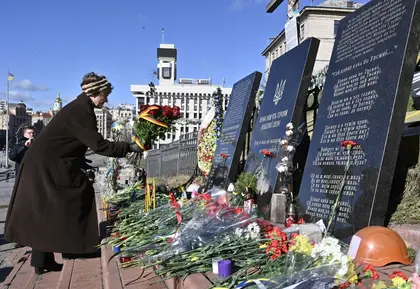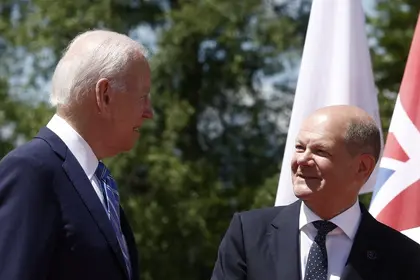Anka Feldhusen was running late to our Zoom call. The former ambassador had just rescued a cake from an overheating oven, though she didn’t seem at all flustered. After helming the German embassy in Ukraine through the pandemic, and Russia’s full-scale invasion, it’s safe to call her an expert in crisis management.
Feldhusen had a more privileged start than most ambassadors. Before presenting her credentials in July 2019, she served in Kyiv as a desk officer in 1994 and deputy head of mission from 2010 to 2015. This was surely good preparation, but then Ukraine was no ordinary posting.
JOIN US ON TELEGRAM
Follow our coverage of the war on the @Kyivpost_official.
By any measure, when she returned from Ukraine to Berlin in June 2023, Feldhusen left a very different country than the one she arrived in. She also left the Ukraine-Germany relationship stronger despite immensely testing events. Her work contributed to both.
Germany was a key partner to Ukraine long before February 2022 and a staunch provider of aid and development assistance. Feldhusen thinks it may have begun with the intake of refugees fleeing the Chornobyl nuclear disaster in 1986.
“I never had any doubt about our relations…I was lucky in that I had known so many of these contacts over all my years in Ukraine. So, I was more confident perhaps than one would think that our relationship was built on a solid basis.”
But when she started as ambassador, relations were complicated by Germany’s Russia policy. In 2014, after Russia’s illegal annexation of Crimea, then-Chancellor Angela Merkel promised a challenge to its aggression. Yet Germany still favored engagement over confrontation. It waved off warnings from Central and Eastern European neighbors and kept the faith in “change through trade”, bringing a dangerous dependence on Russian energy.

Suspect in Ultranationalist Farion’s Murder Arrested in Dnipro
On the pace of Germany’s support to Ukraine
After Russia’s escalation in March 2021, its blockade on supplying Ukraine with lethal aid also weighed heavily on the partnership. For many Ukrainians, the memory of Germany’s offer of 5,000 helmets instead of weapons, just as the Russian horde massed on their border, is not easily forgotten. Though the ship was righted quickly according to Feldhusen.
“When Olaf Scholz came…it was a meeting of two countries with a long term, steadfast and good relationship – with issues, but overall our bilateral relations were reliable,” she said of the German chancellor’s visit to Kyiv last year.
The issue of military aid was largely solved with the Zeitenwende, which abruptly ended the post-World War II reluctance of Germany’s foreign and security policies. And Nord Stream II, the other thorn in the relationship, was remedied when the chancellor halted the project in the wake of Russia’s full-scale invasion.
This doesn’t mean Feldhusen’s job was made easy.
Since the beginning, Ukraine has needed more lethal aid than Germany’s been willing to give – weapons have come via a “boil the frog” strategy where the potency of donations has been turned up slowly. Many argued this was necessary to not provoke a Russian escalation on either side of NATO’s border. Yet it’s perhaps just as likely that, after decades of pacifism, Germans also had to attune to the water temperature.
Of course, piecemeal military support is not unique to Germany. It’s a common theme among Ukraine’s western partners. Still, it was met with desperation in Kyiv, where Feldhusen was charged with managing the friendship.
“The ambassador’s task was to explain things. And I tried to explain again and again Ukraine’s sense of urgency. At the same time, I tried to explain to the Ukrainians that this 180-degree change in our policy was not something that came lightly to us,” she said.
“For German standards, we were fast. But I understand why, for a country at war, [they] cannot understand that part”.
No matter the pace, Germany is now among Ukraine’s biggest arms suppliers. It has committed billions worth of equipment from air defense systems to Leopard tanks, with more on the way. Along with its support for Ukrainian refugees, reconstruction efforts and Ukraine’s bid to join the EU, Germany has assumed a confidence in Ukraine that few expected.
For Feldhusen and her team, all this was accomplished in-country. After the embassy evacuated on the eve of Feb. 23, 2022, they returned to Kyiv in early May with most other Western embassies.
“The Ukrainians took it as an incredible show of support from the international community that we all came back.
Adapting to wartime challenges
“I think the most frustrating weeks of my life were when we were sitting with a small team in Poland, trying to help but not being on the ground. This job of mine, mediating between our two capitals was almost impossible,” she said.
The Russians had retreated from Kyiv only weeks before, but even then, Feldhusen didn’t expect the indiscriminate bombing they would eventually face – the building that housed the empty German consulate was damaged in an attack on Oct. 10 2022.
“As [with] all the inhabitants of Kyiv, we adapted to the threat, we dealt with the risks, and I am very happy that nothing ever happened to my team.”
The post is now led by Ambassador Martin Jaeger, who took over in July this year. He inherits similar stresses to his predecessor as Germany and Ukraine align their visions for ending the war and winning the peace, including Ukraine’s place in NATO.
But the relationship is in great shape, says Ms. Feldhusen. “Many people only see the headlines. But my experience of our relationship is that it was a very reliable and a very strong one, and most of the Ukrainians…they do appreciate that a lot.”
She drummed the point home with an anecdote. In an interview last year, she told European Pravda that Germany “was, is and will be the most reliable partner for Ukraine.” Debate was raging then over whether Germany would supply Ukraine with tanks. Her interviewer, understandably cautious, questioned whether she wanted that in print. “‘Yes!’, I said, ‘because it’s what I believe’, and that’s exactly what happened.”
As for Feldhusen’s own future, she’s staying at the Foreign Office to work on stabilization projects. She probably deserves a moment to reflect on a job well done, but don’t expect her to take it.
“I left Ukraine twice in a big crisis, so I think the sense of unfinished business will definitely stay with me until victory.”
You can also highlight the text and press Ctrl + Enter







